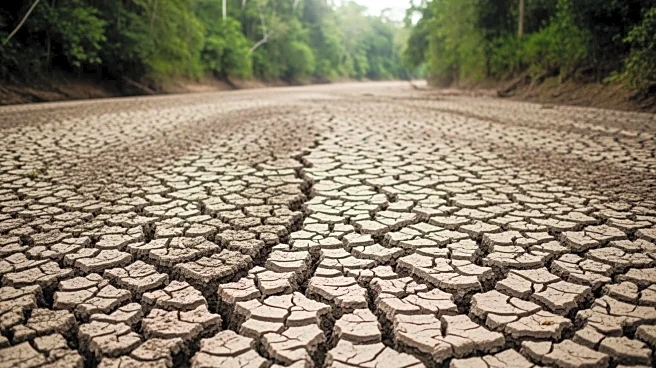What's Happening?
A decade after the catastrophic collapse of a mining dam in Mariana, Brazil, Indigenous communities, particularly the Krenak people, continue to demand justice and reparations. The disaster, which occurred
on November 5, 2015, involved a dam owned by Samarco, a joint venture between Vale and BHP Billiton. It released a massive amount of toxic iron ore waste, devastating the Doce River and surrounding areas, killing 19 people, and causing long-term environmental damage. The Krenak people, who have historically relied on the river for sustenance and cultural practices, describe the event as a profound spiritual and environmental loss. Despite a significant settlement reached in 2024 to address the damages, many affected communities feel that little has changed, and the river remains contaminated.
Why It's Important?
The ongoing struggle for justice by the Krenak people highlights the broader issues of environmental governance and Indigenous rights in Brazil. As the country prepares to host the COP30 climate summit, these unresolved issues cast doubt on Brazil's credibility as a leader in global climate policy. The situation underscores the tension between Brazil's environmental ambitions and its domestic policies, which have been criticized for weakening environmental protections and Indigenous rights. The lack of resolution in the Mariana case serves as a reminder of the challenges faced by Indigenous communities worldwide in securing justice and environmental restoration.
What's Next?
As COP30 approaches, there is increased scrutiny on Brazil's environmental policies and their alignment with global climate goals. Indigenous leaders and environmental advocates are calling for more substantial actions and commitments from the Brazilian government to address past injustices and prevent future environmental disasters. The outcome of the summit and Brazil's subsequent actions will be closely watched by both domestic and international stakeholders, as they could set a precedent for how environmental and Indigenous issues are addressed in the context of global climate negotiations.
Beyond the Headlines
The Mariana disaster and its aftermath reveal deeper systemic issues within Brazil's environmental regulatory framework. Critics argue that the country's approach to environmental licensing and oversight remains inadequate, potentially paving the way for future disasters. The situation also raises ethical questions about the balance between economic development and environmental stewardship, particularly in regions rich in natural resources but vulnerable to exploitation. The ongoing struggle for justice by the Krenak people serves as a poignant reminder of the human and cultural costs of environmental negligence.









